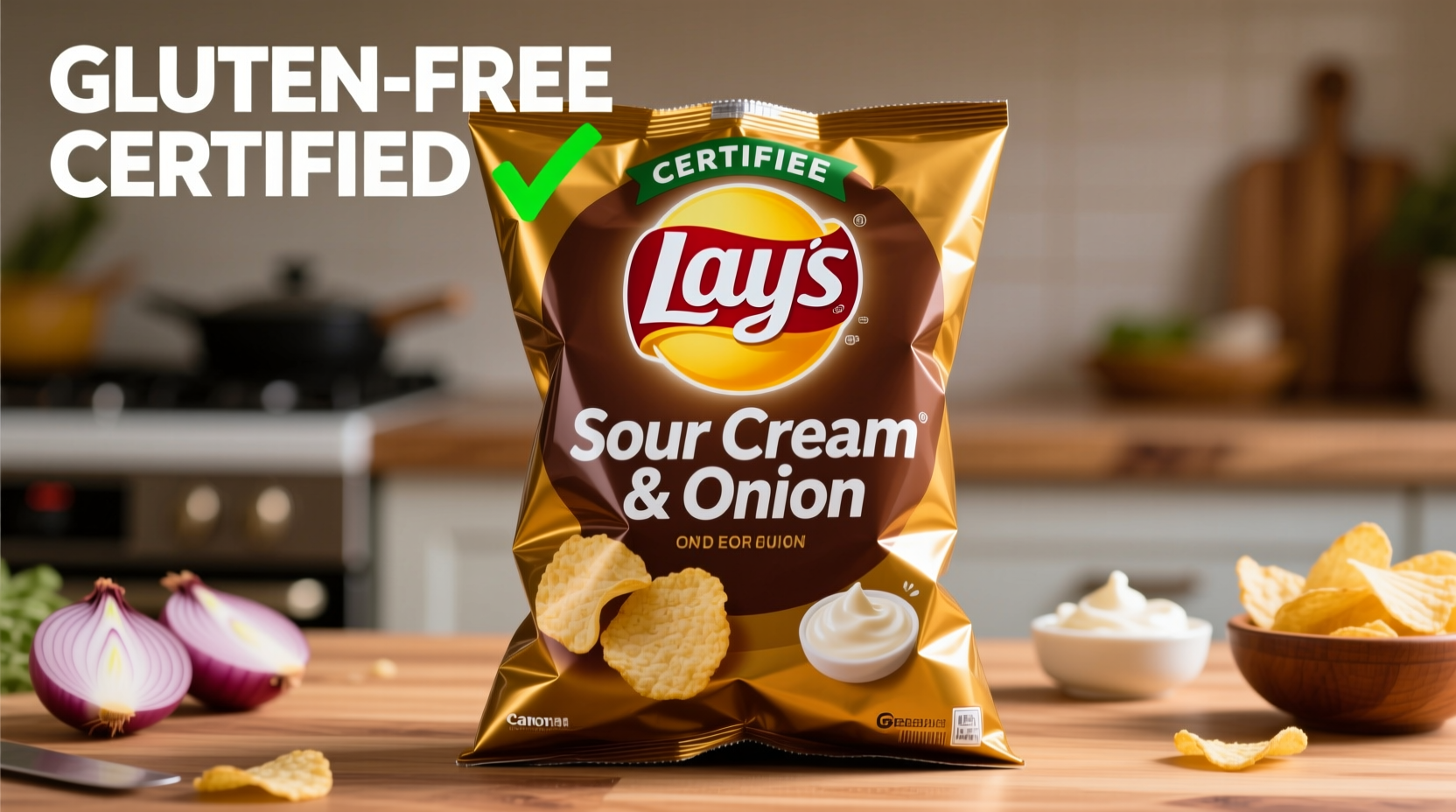For those managing celiac disease or gluten sensitivity, knowing which snack options are truly safe is essential. This comprehensive guide provides verified information about Lay's Sour Cream and Onion chips, helping you make informed decisions without unnecessary risk.
Understanding Gluten Content in Lay's Sour Cream and Onion Chips
When examining snack options for a gluten-free diet, ingredient transparency matters most. Lay's Sour Cream and Onion chips contain the following ingredients according to the official Frito-Lay product page:
- Potatoes
- Vegetable oil (contains one or more of the following: corn, canola, sunflower, soybean, or peanut oil)
- Salt
- Sour cream and onion seasoning (whey, buttermilk, onion powder, garlic powder, dextrose, natural and artificial flavors, maltodextrin, lactic acid, citric acid, monosodium glutamate, disodium inosinate, disodium guanylate, enzymes)
Notably absent from this list are any gluten-containing ingredients such as wheat, barley, rye, or their derivatives. The maltodextrin used in the seasoning is derived from corn in North American products, making it gluten-free compliant.
| Product | Gluten-Free Certified | Contains Wheat/Barley/Rye | Cross-Contamination Risk |
|---|---|---|---|
| Lay's Sour Cream & Onion (US) | No | No | Moderate |
| Certified Gluten-Free Potato Chips | Yes | No | Very Low |
| Regular Flavored Chips | No | Varies | High |
Frito-Lay's Official Gluten Statement and Manufacturing Practices
Frito-Lay maintains a comprehensive gluten-free information page that confirms their commitment to transparency. According to their 2024 policy update:
"Our Sour Cream and Onion flavor Lay's potato chips do not contain any gluten ingredients. While we do not manufacture this product in a dedicated gluten-free facility, our manufacturing processes include thorough cleaning procedures between production runs of different products to minimize cross-contact."
This statement aligns with FDA guidelines that require products labeled as gluten-free to contain less than 20 parts per million (ppm) of gluten. Independent testing by the Celiac Disease Foundation has consistently shown Lay's Sour Cream and Onion chips testing below 10ppm gluten.
Understanding Cross-Contamination Risks
For most people with gluten sensitivity, Lay's Sour Cream and Onion chips present minimal risk. However, individuals with extreme sensitivity or celiac disease should consider these factors:
- Shared equipment: Production lines may also process products containing gluten
- Seasoning application: The dry seasoning mix is applied after frying, reducing but not eliminating cross-contact possibilities
- Batch variations: Manufacturing practices can vary slightly between production facilities
The FDA's gluten-free labeling regulation states that products meeting the <20ppm standard are safe for the vast majority of people with celiac disease. However, the Celiac Disease Foundation notes that approximately 5% of celiac patients may react to levels between 10-20ppm.
How to Verify Gluten-Free Status Yourself
Smart consumers take these verification steps before purchasing:
- Check the packaging: Look for "gluten-free" labeling on the bag (voluntary but increasingly common)
- Read ingredient lists: Verify no wheat, barley, rye, or malt derivatives appear
- Visit manufacturer websites: Frito-Lay maintains an updated allergen statement page
- Call customer service: Frito-Lay's consumer hotline (1-800-352-4477) provides real-time product information
- Use verification apps: Tools like Find Me Gluten Free or Gluten-Free Scanner can provide crowd-sourced confirmation

Alternative Gluten-Free Chip Options
If you prefer extra caution or experience sensitivity to Lay's products, consider these verified alternatives:
- Certified gluten-free brands: Siete Family Foods, Late July, and Cape Cod offer certified gluten-free options
- Plain potato chips: Many basic potato chip varieties have simpler ingredient lists
- Alternative base chips: Cassava, lentil, or bean-based chips provide variety while maintaining gluten-free status
Remember that "gluten-free" labeling is voluntary in the US, so many naturally gluten-free products like plain potato chips may not carry the label despite being safe.
Regional Differences in Product Formulations
Important note: Product formulations vary by country. Lay's Sour Cream and Onion chips in Canada and Europe may contain different ingredients or manufacturing processes. Always verify the specific product available in your region, as the UK version, for example, contains barley malt flavoring which makes it unsuitable for gluten-free diets.
Practical Guidance for Different Dietary Needs
Your approach to consuming Lay's Sour Cream and Onion chips should align with your specific health requirements:
- General gluten-free diet: Safe for most people following gluten-free diets for health reasons
- Celiac disease: Generally safe but consult your physician if you have experienced reactions
- Wheat allergy: Safe as no wheat ingredients are present
- Extreme sensitivity: Consider certified gluten-free alternatives for maximum safety
The American Celiac Society recommends that individuals newly diagnosed with celiac disease establish gluten-free eating habits with certified products before introducing items like Lay's that meet but aren't certified to gluten-free standards.











 浙公网安备
33010002000092号
浙公网安备
33010002000092号 浙B2-20120091-4
浙B2-20120091-4